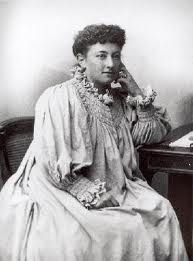
Olive Schreiner was a most interesting woman. Born to a poor and conservative family in 1855, she became a freethinker, a feminist, a vegetarian, and astonishingly, South Africa’s first important novelist. Her claim to fame rests on this book, THE STORY OF AN AFRICAN FARM.
It’a superlatively odd novel. It begins with the story of three children living on a farm in the Karoo, then takes an abrupt left turn into an extended meditation on the existence of god – related bizarrely in the first person plural – and then staggers back to follow up on these children as adults.
The first section is for me the best, with many finely drawn characters, and a lovely depiction of the Karoo in the nineteenth century. Here is the fat and selfish woman who looks after the three kids:
“I know how it was when my first husband died. They could do nothing with me,” the Boer-woman said, “till I had eaten a sheep’s trotter, and honey, and a little roaster cake. I know.
“
And here’s the farm yard chicken:
Even the old hen seemed well satisfied. She scratched among the stones and called to her chickens when she found a treasure, and all the while tucked to herself with intense inward satisfaction.
The existential crisis that is coming casts a shadow over this part of the book, with this a recurring image:
The beetle was hard at work trying to roll home a great ball of dung it had been collecting all the morning: but Doss (the dog) broke the ball, and ate the beetle’s hind legs, and then bit off its head. And it was all play, and no one could tell what it had lived and worked for. A striving, and a striving, and an ending in nothing.
The existential agonising in the first person plural takes up a good third of the middle of the book, and damn, is it boring. I feel bad to say so, because it is also obviously painfully sincere. The child of missionaries, Schreiner clearly had to walk a very long and hard path before she could give up on god, and you do feel sorry for her, though you do wish she wouldn’t go on about it. It’s interesting to read it after MEMOIRS OF A DUTIFUL DAUGHTER, another book about this period. Now we accept that life may well be meaningless, almost as a matter of course, but there was clearly a period during which this idea was first being born, when it was for many people a horrifying and frightening concept. Which I guess it is, if you think about it for too long. But as Schreiner observes, near the end, when one of her characters is in mourning for another, and is sitting in the sun:
There will always be something worth living for while there are shimmery afternoons.
It’s as good a reason to live as any.
